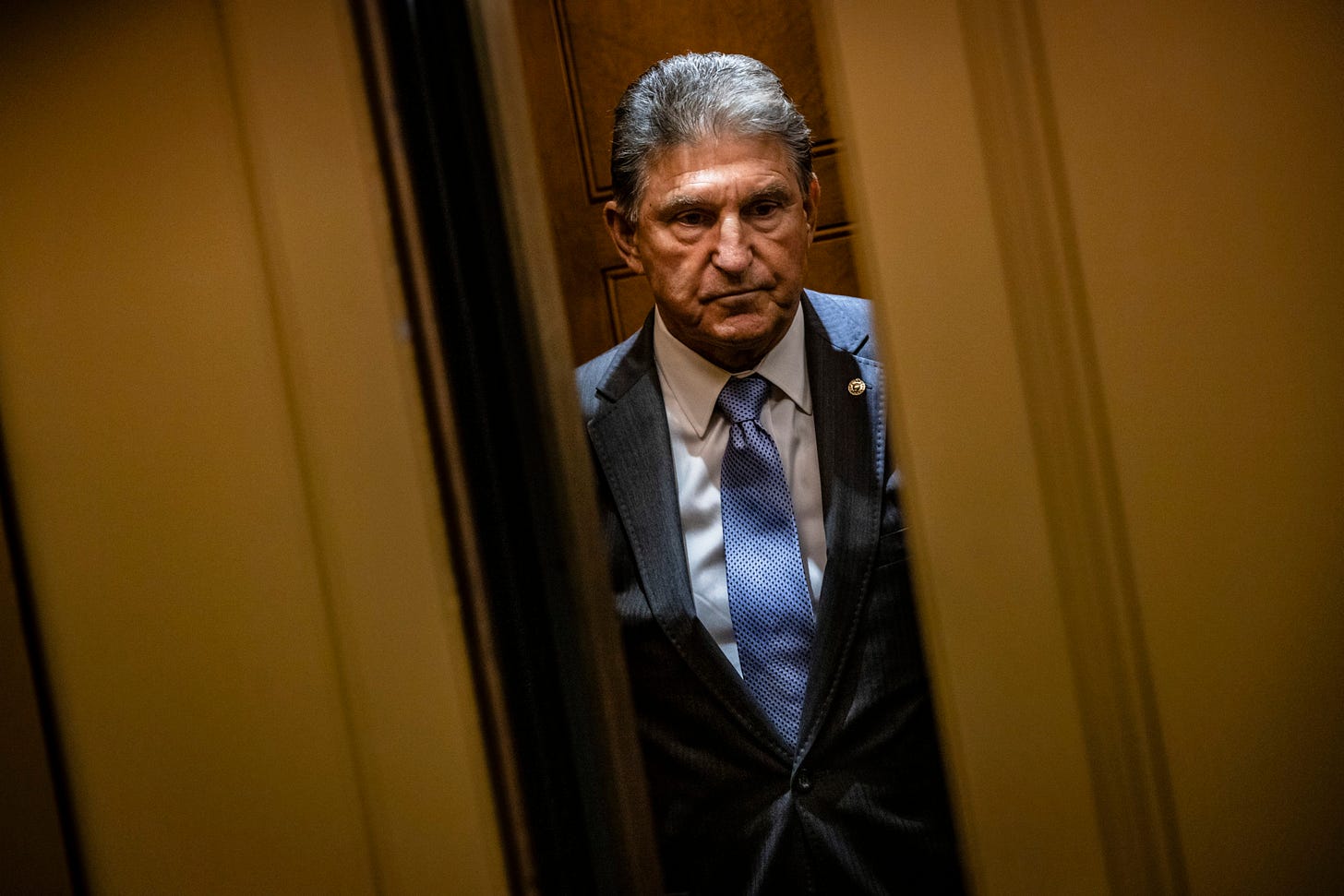Joe Manchin has rescued the Democratic agenda. After blocking President Biden’s Build Back Better plan for nearly a year—as well as subsequent, pared-down versions of the legislation—the West Virginia senator has reversed course. Last Thursday he endorsed a revised $400 billion package that focuses on health insurance subsidies, cutting the cost of prescription drugs, and funding new energy technologies to reduce carbon emissions.
With Manchin’s vote, the bill is likely to pass. But he isn’t just voting for it; he’s selling it. Over the weekend, he appeared on all five Sunday morning talk shows—a rare feat often referred to as a “full Ginsburg”—to make his case for the bill. It was an eye roll-worthy display of political spin. Here’s a summary of his talking points.
1. It’s not Build Back Better. It’s the Inflation Reduction Act.
The vast majority of the new bill comes from Biden’s BBB framework. Most Democrats liked BBB and would be happy to celebrate the passage of these elements of it. But Manchin, who represents a conservative state, doesn’t want to be associated with BBB. He doesn’t want to look like he’s saving the Democratic agenda. He wants to look like he’s killing it.
In his statement announcing the new bill, Manchin went out of his way to rebuke his party and drive a stake through BBB. “For too long, the reconciliation debate in Washington has been defined by how it can help advance Democrats political agenda called Build Back Better,” he declared. “Build Back Better is dead, and instead we have the opportunity to make our country stronger by bringing Americans together.”
The new bill is called the “Inflation Reduction Act of 2022.” It’s a preposterous title, because none of the bill’s main provisions were designed to reduce inflation. “Inflation reduction” was slapped on as a last-minute makeover, presumably to appease Manchin, since fear of inflation was his long-stated reason for having held out against BBB.
2. It’s not spending. It’s investment.
“I couldn’t get there with Build Back Better. It was $3.5 trillion of spending,” Manchin explained on CNN’s State of the Union. In contrast, he argued, the Inflation Reduction Act knocked “$3.5 trillion dollars of spending down to $400 billion of investment.” On Face the Nation, Fox News Sunday, and This Week, he made the same pitch: BBB was a “spending bill,” but the IRA was an “investment bill.”
This is a purely political distinction. Progressives always describe their favorite spending bills as “investment.” Bernie Sanders used this term last fall when he castigated Manchin, in a West Virginia newspaper op-ed, for opposing BBB’s “investment” in affordable housing. Several weeks ago, Sanders again rebuked Manchin, this time for obstructing BBB’s plans to “invest heavily in combating global heating by transforming our energy system away from fossil fuels.”
Now Manchin has embraced most of BBB’s climate provisions. And to cap off his reversal, he’s adopting Sanders’ language. He knows, as Sanders does, that “spending” sounds like a waste of money, but “investment” sounds prudent and cost-effective.
3. It doesn’t raise taxes. It closes loopholes.
On Fox News Sunday, Manchin insisted that his bill’s establishment of a 15 percent minimum tax for billion-dollar companies—up from zero percent—wasn’t really a tax increase. “It does not raise taxes,” he told Bret Baier. “All we did was close loopholes.” Thirty seconds later, Manchin repeated, “We did not raise taxes. We’ve closed loopholes. . . . I made sure there was no tax increases in this whatsoever.”
Baier asked Manchin whether Democrat Kyrsten Sinema, who had previously stated her opposition to raising taxes, would go along with the bill. Manchin went right back to his talking point: “She’d been very adamant about tax increases. We made sure there’s no tax increases. But loopholes is a different thing.”
The loophole/increase distinction, like the investment/spending distinction, is semantic. As Republican Sen. Pat Toomey explained in a rebuttal to Manchin, the 15 percent minimum levy on large companies is a tax increase on the affected companies. That’s how it raises revenue. But “raising taxes” is unpopular, and Manchin doesn’t want to lose Sinema’s vote. So he clings to the word “loophole.”
4. It’s not a green bill. It’s red, white, and blue.
In much of the United States, being “green” is popular. Restaurants, grocery stories, and retailers advertise it. But Manchin, who represents a coal state, seems to have decided that among his target audience, “green” is a dirty word. So he’s pointedly rejecting it.
“This is not a green deal. It’s not a Republican deal. It’s not a Democrat deal. It is a red, white, and blue deal,” Manchin declared on CNN. A few minutes later, he repeated: “It’s definitely not a green bill. This is a red, white, and blue bill.” On Fox, he delivered the same message: “It’s not a green bill. This is a red, white, and blue bill.”
Presumably, Manchin is trying to distance himself from the Green New Deal, an ambitious environmental resolution backed by the left. That resolution was nonbinding, but it’s been tarred by Republicans as a threat to freedom, jobs, taxpayers, and the economy. So Manchin is steering clear of both the “green” and “New Deal” parts. And on the Sunday shows, he generally avoided the word “climate,” preferring to talk about “energy” instead.
Manchin’s word games, on their face, are risibly transparent. Investment is spending, closing loopholes is raising taxes, and the Inflation Reduction Act is mostly a reassembly of ideas from Build Back Better. But Manchin’s tour of the talk shows did move one pivotal player: Joe Manchin. Now that he has forcefully defended the new bill, it will be that much harder for him to withdraw his support, as he did in negotiations over BBB. The salesman has closed the deal with himself.





